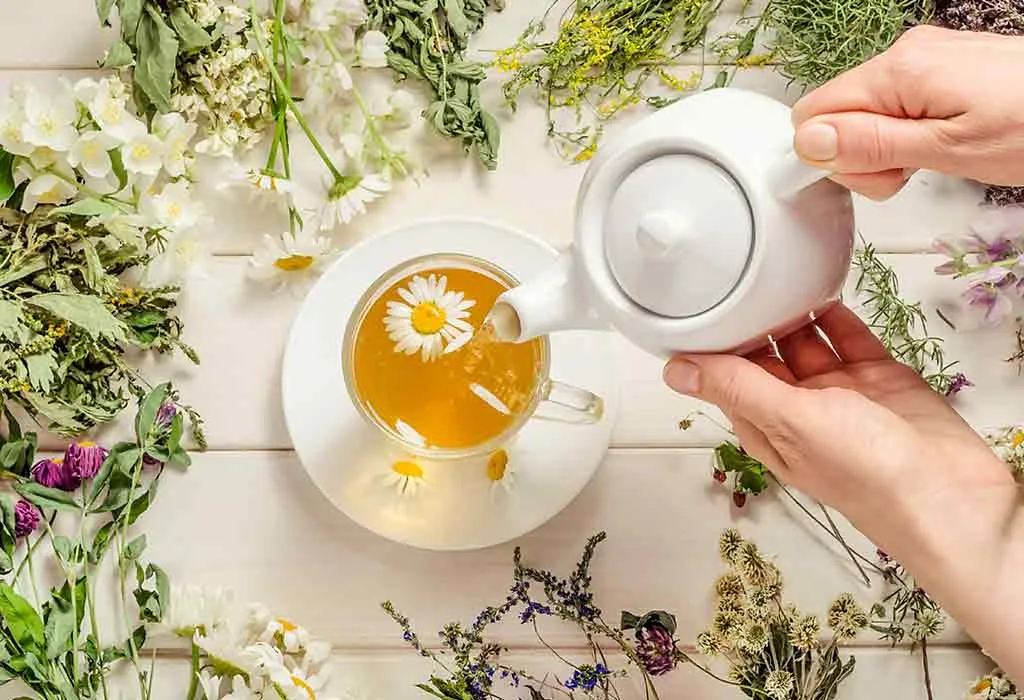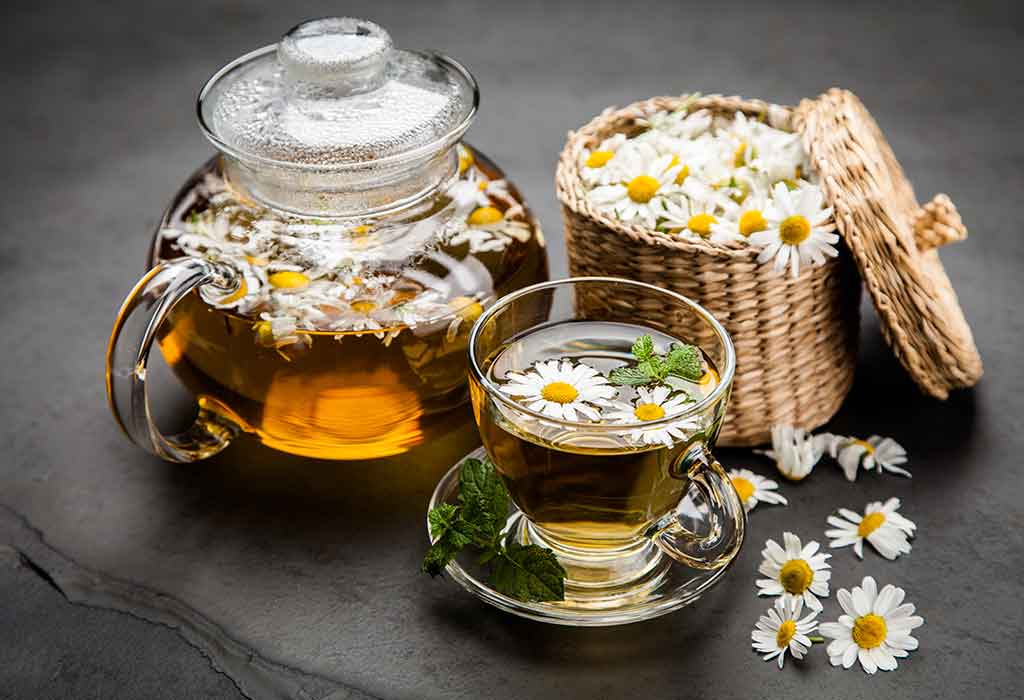Chamomile Tea While Breastfeeding – Benefits and Safety Tips
- Is It Safe to Consume Chamomile Tea While Breastfeeding?
- Health Benefits of Chamomile Tea During Breastfeeding
- Does Chamomile Tea Increase Breast Milk?
- How Much Chamomile Tea Is Safe to Drink During Breast Feeding?
- How to Pick and Store a Good Quality Chamomile Tea?
- Safety Precautions to Take While Using Chamomile Tea
- When to See a Doctor?
- FAQs
A traditional household antidote made from dehydrated chamomile blossoms gives you a potent supplement, namely Chamomile tea. The flavonoids present in chamomile plays a powerful role in sustaining its medicinal property. When made into a herbal tea, it gives a soothing effect to the nerves, assuming the guise of a sedative. Like any other herbal tea, chamomile must be taken in smaller dosages or the recommended dosage as advised by your doctor till it is safe for you to handle slightly larger doses.
Scroll down to read more about chamomile tea and breastfeeding, the tea’s benefits and safety tips while consuming it during breastfeeding.
Is It Safe to Consume Chamomile Tea While Breastfeeding?
Known to be one of the most potent teas, chamomile has been used throughout centuries for its capacity to curb illnesses, including diabetes and cancer. Chamomile is also said to have anti-inflammatory properties, and the tea is said to bring about a soothing calmness to your frayed nerves. Much research attention has not been given to the effects of Chamomile tea for lactating mothers. Still, it is best if you consult your medical practitioner or a doctor before proceeding further. Chamomile tea indeed would be a blessing for women during their pregnancy period to soothe their nerves and the anxiety build-up.
Although the US Food and Drug Administration Department (US FDA) has recognized chamomile as a safe agent to use as a flavoring medium and for seasoning purposes, there is a lack of research into the tea’s potency for lactating mothers has not been made viable yet. If you are under extreme duress and are craving chamomile tea, you can always consult your medical practitioner for the safe limit for taking the tea. Since chamomile can be found in varied regions with differing attributes and is a potent herb, side effects can occur if you are not careful enough.
Health Benefits of Chamomile Tea During Breastfeeding
If you have been wondering about the health benefits of chamomile tea for breastfeeding moms, we have compiled quite an exceptional list for you to go through related to chamomile tea in nursing.
1. Promotes Sleep Cycle
Mothers often experience insomnia or a disturbance in their sleep patterns when they are nursing their babies. It can be quite hard to get some shut-eye once the baby wakes up during the wee hours of the night. Chamomile tea produces sleep-inducing oxidants, relaxing their body and putting them right back to sleep, soothing their nervous system (1). Since chamomile tea lacks caffeine, it can be productive for mothers too.
2. Treats Cold
If you experience an insistent cold and suffer from a headache arising from it, chamomile tea can act as your go-to cure. If you have a nasal clog, you can also give yourself steam so that it clears up.
3. Anti-Inflammatory Properties
Chamomile tea is said to consist of various antioxidants and compounds that have healing properties (2). You must also understand that there are other reasons you might be experiencing inflamed skin, so if the tea does not help, it is better to consult a healthcare professional. Sunburns can also be treated by brewing the tea, chilling and then soaking it on a cloth and pressing it on the affected area.
4. Treat Your Digestive System
For generations, chamomile has been used almost redundantly to treat the entire digestive system. Gastrointestinal concerns like diarrhea, nausea, dysentery, and the like have been made better by just drinking chamomile tea.
5. Removes Dandruff
Mothers do not get much time to tend themselves once the baby is born, so they become a casualty of the dandruff factor. Nobody likes having dandruff on their hair cause your scalp becomes itchy and unbearable. Here again, chamomile tea comes to the rescue. Chamomile tends to your hair, preventing it from becoming itchy and making it healthy.
6. Menstrual Pain Reduction
Experiencing menstrual pain is no joke, especially if you have a low threshold for it. Recent research studies have shown that chamomile tea helps lower the pain that most women have to go through (1).
7. Stress Reducer
Chamomile tea can soothe and calm your nerves, acting as a natural sedative.
8. Antioxidant Support
Chamomile is rich in antioxidants, which can help combat free radicals in the body. Antioxidants are important for overall health and can support the immune system, which is crucial for a breastfeeding mother and her baby.
Does Chamomile Tea Increase Breast Milk?
Although there is insufficient evidence to support the theory that chamomile tea, when nursing increases breastmilk, it is indeed true that it has galactagogue effects. This means that chamomile has components that help increase the production of milk. But you must also take into consideration the fact that it can vary for different individuals.
A study has found that upon the intake of chamomile tea, milk production had increased by 20% compared to that of the normal production of milk. Even then, healthcare professionals would still recommend that you pump regularly or nurse on need because it is safer.
How Much Chamomile Tea Is Safe to Drink During Breast Feeding?
Drinking two eight-ounce cups of tea, which includes chamomile tea, is typically considered safe for breastfeeding mothers.
How to Pick and Store a Good Quality Chamomile Tea?

Chamomile is documented as one of the world’s most ancient and medicinal herbs associated with the daisy family. Chamomiles contain antioxidants that relax your nerves and muscles, in addition to the essential oils they produce, which are used in aromatherapy.
1. Growing Chamomile
If you prefer to grow the German chamomile in your backyard, all the better since they are quite easy to grow. All summer long, chamomiles will be in full bloom and ready to be harvested. Pick the ones whose petals are open the widest, as we need the flowers in their full potency.
While picking the flowers, make sure to sort out all the flowerheads and pluck each flower individually not to get crushed. After you have plucked them, search for any insects or dirt that came along and separate them. You can also wash the flowers gently, drain and pat them dry if there is excess dirt. You can air-dry the blossoms for one-two week in a dark space and then dehydrate them.
Note that you have to use the lowest setting while dehydrating them so that they retain the potency. Next, you’ll need to store the dehydrated flowers in a dry and air-tight jar, preferably mason jars, in a cool place. Make sure you keep the jar out of direct sunlight so that it maintains its flavor and medicinal properties.
2. Chamomile Tea Bags
Now, if you cannot grow or do not have enough space in your house to grow chamomile, you can always opt for buying chamomile tea bags. These herbal tea bags are easier to handle and reduce the risk of exposure. You must always ensure that the product is USDA certified organic and non genetically modified organisms (GMO) since there can be repercussions for you and the baby otherwise.
3. Chamomile Loose Leaves
If you prefer buying loose chamomile leaves, it is recommended that you buy a USDA-certified product. Loose leaves last for a much longer duration and can also be used for aromatherapy.
You must pick and store chamomile blossoms properly to keep their fragrance, essence, and benefits intact.
Safety Precautions to Take While Using Chamomile Tea
Absolute care and precaution are to be taken before ingesting any chamomile product. People who are allergic to pollen may exhibit symptoms of vomiting, diarrhea, and wheezing. We have listed down a few cautionary measures which are to be noted for drinking chamomile tea while breastfeeding.
- USDA-certified chamomile tea is the best choice for a lactating mother so that she and the infant do not suffer any setbacks.
- Drink only the recommended dosage of chamomile tea as sometimes it can have an adverse effect.
- To reduce contamination, use chamomile tea bags.
- Use a lesser concentrate of chamomile since a greater concentration can cause you to throw up or influence nausea.
- It is best to consult a doctor if you want to try out chamomile tea during the breastfeeding period to see if there is an increase in milk production.
- If you experience any allergic reactions while consuming chamomile tea (3), it is better to avoid it altogether. Make sure you check for signs and symptoms when feeding the infant. If you notice any symptoms that bother you, bring them up to your doctor’s notice.
- In case you are under another medication and still consume chamomile tea or any other herbal drink for that matter, make sure that your consultant knows as they can often clash with each other, producing a negative effect on your body.
When to See a Doctor?
The lactation period is an important stage both for the mother and the infant. So, it is of absolute necessity that you need to consult a healthcare professional before jumping onto the chamomile tea bandwagon. If it is not a risk factor for you and the infant, the medical practitioner might be alright with you taking chamomile in limited dosage. And if you are prone to be either allergic or if your doctor cautions you, take it under advisement.
FAQs
1. Can Chamomile Tea Alleviate Skin Issues While Nursing?
Chamomile is recognized for its antioxidant, antiseptic, and anti-inflammatory characteristics. Utilizing ointments containing chamomile topically may be beneficial for treating minor skin infections, abnormalities, irritations, and sunburns.
2. Does Chamomile Tea Provide Relief for Nipple Soreness When Breastfeeding?
Chamomile tea is renowned for its therapeutic qualities, which can potentially aid in alleviating sore and cracked nipples. It’s worth considering chamomile-infused topical ointments specifically designed for this purpose. Always ensure that these ointments are safe for newborns, and apply them following a feeding session for optimal results.
Chamomile is generally a safe herbal drink if taken in the recommended dosage, especially for breastfeeding women. Since not much in-depth study has been conducted into the benefits of chamomile, it is treated as a supplement rather than as a medication. Drinking one cup of chamomile tea a day can bring about excellent results to your immune system and overall hygiene.
References/Resources:
1. The Hidden Health Benefits of Tea; pennmedicine.org; https://www.pennmedicine.org/updates/blogs/health-and-wellness/2019/december/health-benefits-of-tea
2. The Best Teas to Drink for Your Health; health.clevelandclinic.org; https://health.clevelandclinic.org/teas-for-health/
3. Chamomile; NCCIH; https://www.nccih.nih.gov/health/chamomile
4. Herbal and Traditional Medicines in Breastfeeding; e-lactancia.org; https://www.e-lactancia.org/media/papers/Herbal-traditional-medicines_BF-RoyalAustr2013.pdf
5. Herbal Tea & Pregnancy; americanpregnancy.org; https://americanpregnancy.org/healthy-pregnancy/is-it-safe/herbal-tea/
6. What Is Chamomile Good For? Benefits, Side Effects & Drug Interactions; simhcottumwa.org; https://simhcottumwa.org/what-is-chamomile-good-for-benefits-side-effects-drug-interactions/
7. Chamomile; uofmhealth.org; https://www.uofmhealth.org/health-library/ug1993spec
8. Chamomilla (Matricaria recutita); hsis.org; https://www.hsis.org/a-z-food-supplements/chamomilla-matricaria-recutita/
Also Read:
Drinking Green Tea during Breastfeeding
Ginger & Ginger Tea while Breastfeeding
Consuming Coffee/Caffeine when Breastfeeding
Is Consuming Peppermint Tea while Breastfeeding Safe?
















